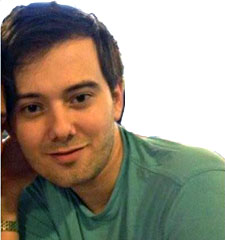
Marin Shkreli, whose move to buy Daraprim means profit at the hands of the needy.
Photo: Shkreli’s LinkedIn Profile
By: Mike Givens*/TRT Columnist—
Kim Davis has had enough media attention, don’t you think? By the time you read this column, the delusional clerk from Kentucky will have had more than the standard 15 minutes of fame “Christian” hatemongers derive when they force their hateful beliefs onto others. Her meeting (or non-meeting?) with the Pope may have been newsworthy, but there’s another individual who troubles me even more than Davis: Martin Shkreli, the CEO of Turing Pharmaceutical Company.
In August, Turing Pharmaceutical Company, under the leadership of Shkreli, purchased Daraprim, a prescription drug used to fight an infection that can ravage those with weakened immune systems, for $55 million. Originally introduced on the market in 1953, the drug is vital for people living with cancer, HIV/AIDS, and other conditions that cause immunodeficiencies. The World Health Organization lists the drug as an essential medicine.
The company recently raised the price from $13.50 per pill to a whopping $750 per pill—an increase of more than 5,000 percent. In response to public backlash, Shkreli told the media that the drug needed to make a profit, but eventually acquiesced to pressure to lower the drug’s price. As I’m writing this column, Shkreli and his company have yet to announce what the new price will be. [pullquote]I’ve never met Martin Shkreli, and probably never will, but I highly doubt that when growing up, the son of Albanian and Croatian immigrants spent his childhood thinking of ways to make life-saving prescription medications unaffordable at the expense of saving lives.[/pullquote]
This incident alone is infuriating on its face, but when you look at other alleged instances of bad behavior in Shkreli’s career, you can only come to one conclusion about him: this a man with a serious appetite for making money.
In late September, The New York Times profiled Shkreli and became one of the first media outlets to report on the infamous Daraprim price hike. But the piece didn’t stop there. It detailed a litany of cringeworthy allegations against Shkreli including accusations that he didn’t pay two former employees; another former employee claiming that Shkreli harassed him and his family over social media for purportedly stealing money; a successful lawsuit filed by the Lehman Brothers against a hedge fund Shkreli created; and the board of another pharmaceutical company accused Shkreli of using company funds to pay off investors in another hedge fund.
The accusations of harassment and unprofessionalism paint Shkreli as controversial, to say the least. However, this is business as usual for people of Shkreli’s ilk. Why make a life-saving drug affordable when you can jack up the price and make millions off the people who need it most?
We’re hearing more stories about the rising cost of healthcare, skyrocketing prices for prescription drugs, and the sad fact that many people forgo health care so they can pay for other expenses. [pullquote]But we’ve made too many scientific advancements in treating illnesses like HIV/AIDS, cancer and a host of other diseases to make their benefits unattainable to those who can’t afford it; and in many cases those same people are the ones impacted the most. [/pullquote]
In August, Freakonomics Radio debuted a podcast discussing the controversial idea of a “glorious sunset,” where a health insurance company calculates the cost of end-of-life healthcare coverage for a terminally ill person and pays that person a percentage of the cost to forgo seeking treatment. Though the idea is just that—an idea—the fact that conversations like this are happening in this country is troubling.
We consider ourselves to be living in a first-world country, but have a third-rate healthcare system. The Affordable Care Act, though in its infancy, is a small, progressive step towards rectifying the issue, but we’re still years—if not decades—from a system that makes sure each and every one of us doesn’t have to worry about the Martin Shkrelis of the world.
What disturbs me is that a disease like AIDS is no longer a death sentence, but could very well be if pharmaceutical companies continue making the cost of life-saving drugs unaffordable, a practice which is quite common.
I get it. We live in a capitalist economy where innovations and ideas are rewarded with patents and profits. But we’ve made too many scientific advancements in treating illnesses like HIV/AIDS, cancer and a host of other diseases to make their benefits unattainable to those who can’t afford it; and in many cases those same people are the ones impacted the most.
This country produces some of the brightest minds in the world, from Harvard to Stanford. Instead of encouraging up-and-coming generations to seek the American Dream through cutthroat capitalist practices, maybe we should teach them that the American Dream is a collective experience, one that is attainable by all. And part of achieving that dream is working collaboratively to make sure the rising tides lift all boats. [pullquote]Why make a life-saving drug affordable when you can jack up the price and make millions off the people who need it most? [/pullquote]
I’ve never met Martin Shkreli, and probably never will, but I highly doubt that when growing up, the son of Albanian and Croatian immigrants spent his childhood thinking of ways to make life-saving prescription medications unaffordable at the expense of saving lives.
What I do believe is that we can do better. And the foundation of the betterment for all is seeing people as people and not revenue streams. Otherwise, none of us are worth saving.
*A graduate of the Boston University College of Communication, Mike Givens has been a social justice advocate for more than seven years. During that time he’s worked on a range of initiatives aimed at lifting up marginalized populations. An experienced media strategist and public relations professional, Michael currently devotes his spare time to a number of vital issues including racial justice and socioeconomic equity.







